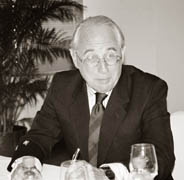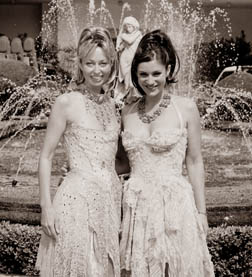|
observer |
|
|
|
|
|
OTHER LINKS |

|

|

|
Past memories and future hopes
Standing tall and imposing, this pristine white sprawling hotel was once the residence of Sir Thomas Maitland, British Governor of Sri Lanka appointed by King George III. He arrived in the country in 1805, a 46 year old confirmed bachelor, described as being extremely committed to his work and dedicated to official duties, but always the typical Englishman who believed in maintaining his dignity and decorum even being described as "distant" and "unapproachable" at times. But all this seems to have flown out of the window that fateful evening when a sultry Mestizo dancing girl - Lovina Aponsua - turned up at his residence by the sea along with her father's troupe of dancers, and with her sensuous moves and bewitching eyes, managed to affect the senses and sensibilities of this staid British Governor as never before. She danced her way in to the pages of history, when Sir Thomas Maitland found himself quite incapable of resisting the lethal combination of attractions he saw in this half Portuguese half Sinhalese dancing girl said to be of a caste that society decreed she went about bare-breasted. The progress of their romance is legendary. (It is said that this Governor who upto that time had done everything by the book, was so enamoured by Lovina's beauty, that he had a secret tunnel constructed leading from the disused water well in her garden, direct to his luxurious bedchamber!) Their relationship lasted throughout Sir Thomas Maitland's stay on this island and when he left in 1811 to take up a new posting in Malta, he had to leave his lady love behind, but he did not leave her empty-handed and broken hearted.
He gifted her with a large extent of land in the area around his residence which in time grew to be known as "Mount Lavinia" after Sir Thomas Maitland's anglicized version of Lovina's name which had become "Lavinia" by that time. Viscount Ian Maitland, the 19th Earl of Lauderdale, was in Sri Lanka for the celebrations accompanied by his wife Viscountess Anne Maitland, Allan Maitland who is Secretary to the Maitland Clan and Ms. Mignonne Holsinge. Resplendent in his kilt and full regalia which denotes that he belongs to the Maitland Clan from Lauderdale in Southern Scotland just south of Edinburgh, Viscount Ian Maitland had plenty of anecdotes to share. He recounts how Sir Thomas Maitland spent three months touring "Ceylon" and then sent a 160 page report back to England on the state of the island and the Governor's house which he had described as being "rubbish." His astute thinking is demonstrated by what he did next. He wrote back informing the office rs in England that he "now had a new house." He explained that he had used the builders "who are on the payroll and you are already paying for," he had sold some Government houses which were not needed, got himself the house he wanted and a surplus of Sterling Pounds 20,000 in to the bargain! Sir Thomas Maitland's record shows that his administration both in Ceylon and Malta were excellent "He was an autocratic man, but cared very much about what he did and a very efficient colonial governor and enacted major reforms both in Ceylon and Malta," says Viscount Ian Maitland. He adds: "He was firm with his superiors and never hesitated to do what he thought was right." In fact, he was required to draw up a strategic plan for the liberation of the Latin Americas. This he did and it was filed away in the war offices in England. Twenty years later, when the campaign was led to get the Spaniards out of Latin America, Maitland's strategy was followed to the letter. Citing another example Viscount Ian Maitland recalls how when he took over the administration of Malta, Sir Thomas Maitland had been asked to "take over the Roman Catholic Church, rip out its contents and make it Anglican." His reply was sent in just one word - an emphatic "No!" Describing the Clan Maitland, Viscount Maitland explains that the Maitlands have been in Lauderdale since 1250 and most of the lowland family originated from a tiny part of France in the Cotentin region which is close to Cherbourg. They came over during the Norman invasion in 1080 and their presence in Lauderdale is fully documented historically since 1250. Judging by the exploits of the Maitland Clan around the globe, romance has figured high on their agenda. Viscount Ian Maitland recalls his 4th great grandfather who died in New York as Deputy Adjutant General, 3rd in command in North America. "He married on his deathbed, a lady by whom he already had three children with a fourth on the way!" And another relative, Frederick Louis Maitland raised a family in Jamaica, returning to Scotland years later to get married to a Scottish lady. "There were many Maitlands on the tea plantations in Sri Lanka while another was a banker in Calcutta," he notes. This was Viscount Ian Maitland's first visit to Sri Lanka. "I think this is a fascinating country," he said and was looking forward to visiting Kandy and tea plantations in the hill country formerly owned by the Maitlands. Also in Sri Lanka for the bicentennial celebration, Henry Brownrigg is a direct descendant of Sir Robert Brownrigg who replaced Maitland as Governor in 1811. He explains that the family originates from the English/Scottish border of Cumberland. "Sometime in the 17th century they moved to Ireland and Robert Brownrigg was born in Southern Dublin in the County of Wicklow in 1759," says Henry Brownrigg. "His father was my namesake Henry, and his mother was an Irish protestant girl." He was gazetted an ensign of the 14th Regiment and rose in the army purely based on his capabilities which was not so easy in those days when commissions had to be purchased. "His big break came when he attracted the attention of the Duke of York, brother of King George III. The Duke of York became the Commander in Chief of the British Army and Brownrigg became his Military Secretary, a position of considerable influence and power. In 1808 he was made Lieutenant General and was appointed Governor of Ceylon in 1811, serving here from 1812 until 1820 when he returned to the U.K. Henry Brownrigg says his ancestor had no extra marital affairs. His wife Sophia accompanied him to Ceylon and was involved in many social responsibilities. Very much involved with the British Association for Cemeteries in South Asia (BACSA) Henry Brownrigg says the association has over 1700 members "and we try to restore and record cemeteries wherever the East India Company went from Zanzibar to Japan, maintain those in a state of dereliction, and record the inscriptions for archives as part of the British Library in London so it is preserved as a part of history," he says. His own particular area covers Sri Lanka, Kerala, Tamil Nadu. Henry Brownrigg is also an Art Dealer in London having worked earlier with an international mining group. Entertainment as in days gone by was provided not by an alluring Mestizo dancing girl named Lovina, but by two equally entrancing young ladies - Deborah Vine and Karin England - known as the "Opera Babes." And the icing on the cake for the centennial celebrations was provided by two entrancing young ladies - Deborah Vine and Karin England - known as the "Opera Babes." Clad in gowns especially designed for them by Elizabeth Emmanuel who burst in to the public eye when she designed the late Princess Diana's wedding gown, they chose the perfect accessories created by Michel Negrin, French jewellery designer who has perfected the art of combining modern and antique styles to create truly unique pieces of jewellery. "We love wearing Elizabeth Emmanuel's creations as her stuff is very theatrical and also edgy and funky which sums up what we do," said Deborah. Theirs is truly a fairytale with a happy ending. "Discovered" while busking in Covent Garden to pay for extra singing lessons, they were chosen to sing the theme song - "One Fine Day" on T.V. for the FA Cup Finals at the Millennium Stadium in Cardiff, Wales in 2001."We made an album that became a best seller and got lots of offers," says Karin. Their career since then has sky-rocketed and venues chosen by them to perform at include the Los Angeles Opera House where they performed with Placido Domingo, the Royal Albert Hall many times, Buckingham Palace a couple of times, and they became the first British classical act to perform at the "Star Dust" in Las Vegas! Guests at the celebrations were enthralled by the "Opera Babes." Their combined voices, choice of music, glittering attire and graceful movements transported guests to a different era when gracious entertaining was the order of the day - exactly as their hosts at the Mount Lavinia Hotel intended them to do in this present day and age. |











